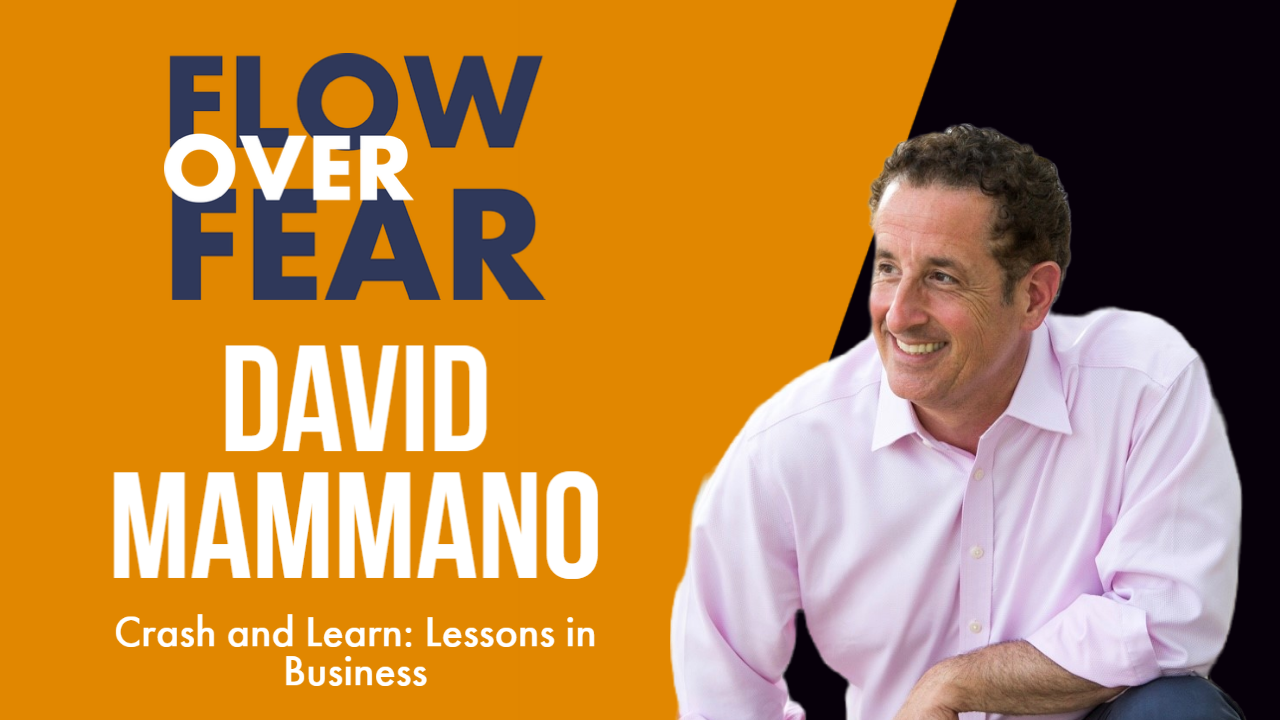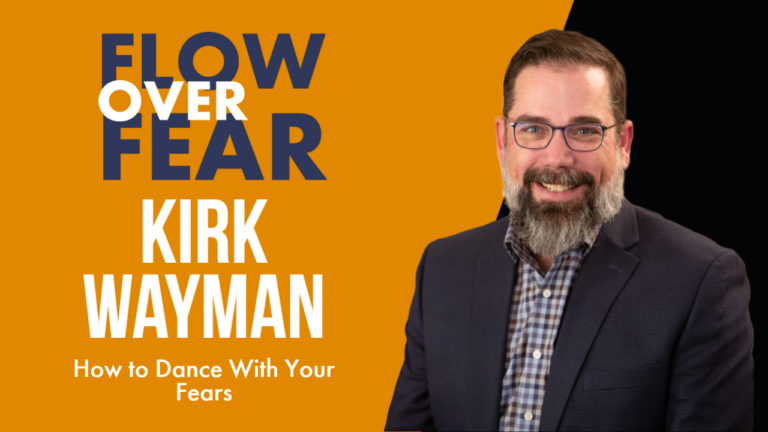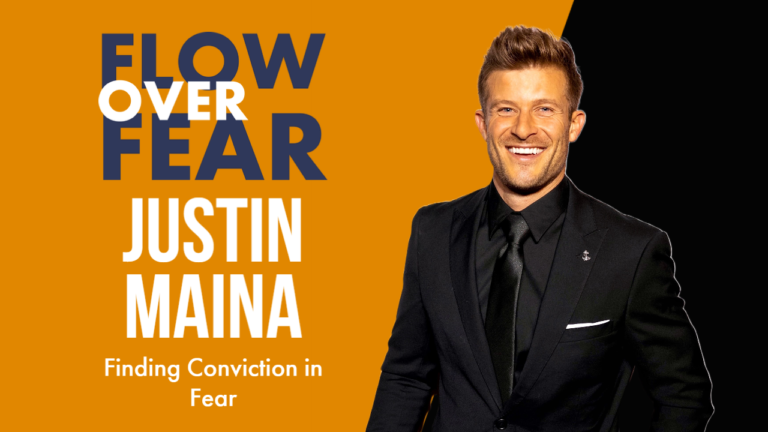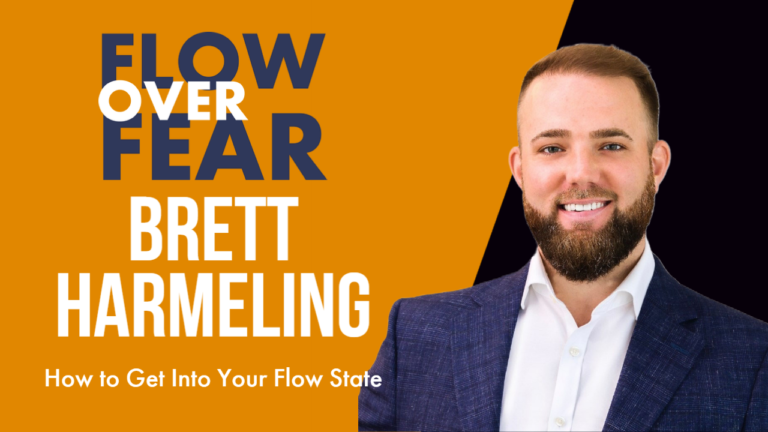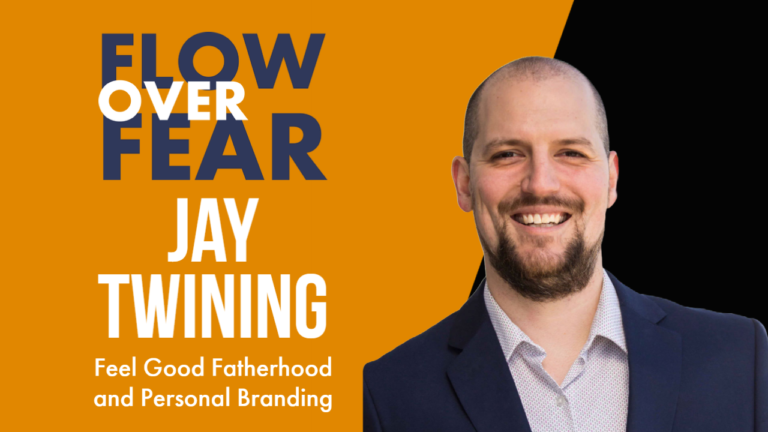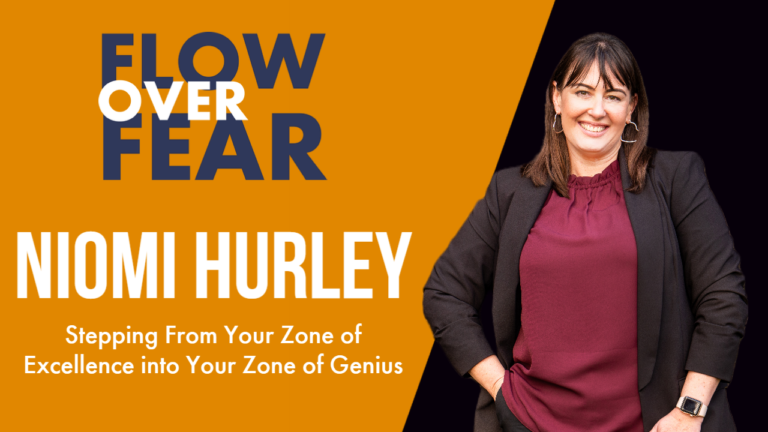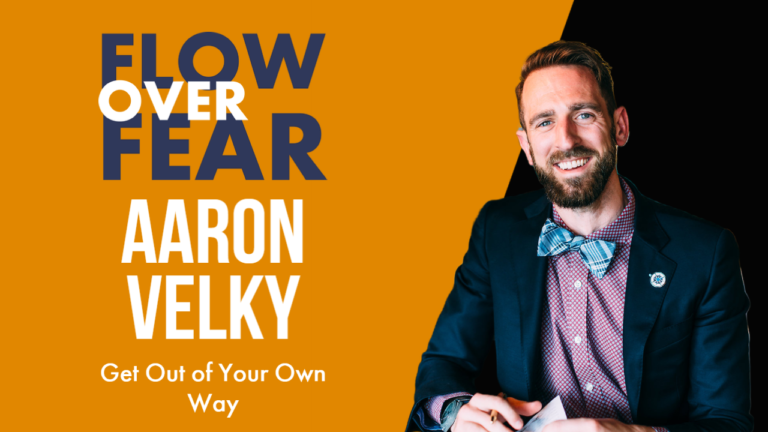Crash and Learn with David Mammano
One of the things that scares people from being entrepreneurs is the uncertainty of what can happen. But it’s all part of the fun! The ability to fail and fail forward is what sets successful people apart. In today’s episode, Adam Hill speaks with David Mammano about overcoming fear and failure as an entrepreneur. David is an entrepreneur and a teacher of entrepreneurs. He’s a writer about entrepreneurs and a speaker about entrepreneurs. It’s obvious he loves the entrepreneurial life.
David is the founder of seven businesses, a three-time Inc Magazine 5000 growth company winner, a two-time TEDx speaker, and an adjunct professor at the University of Rochester in New York. He now leads the YOUtopia, a network that helps entrepreneurs to grow and connect. He’s also the host of the highly acclaimed podcast, “The Gonzo Experience”, and author of three books, including his most recent bestseller CRASH and LEARN: Lessons in Business.
Here are some power takeaways from today’s conversation:
- David’s career background from a radio job to a magazine business
- Failure is giving up
- Seeing the light at the end of the COVID tunnel
- Getting out of the fear
- What prompted him to write a book
- David’s version of “crash and learn”
- Getting good at mitigating risks as an entrepreneur
- Finding the balance between a setback and a failure
Episode Highlights:
[08:29] Failure is Giving Up
As an entrepreneur, it’s important to have a growth mindset, seeing failure as giving up. If your business doesn’t go well the first time, then start creating a second business. If it fails again, then do a third business – until you get it. Failure is when you decide to give up and stop being an entrepreneur, and you stop doing what you’re doing. Having this kind of mindset develops persistence.
[19:33] Getting Out of The Fear
A lot of people let fear be an obstacle to achieving their best. One of the ways we can get out of that fear is to find a community of like-minded people that are going through the same thing and inspire each other to push through perceived obstacles. Mastermind groups like YOUtopia bring in speakers who are going to inspire people to realize that these barriers are not real and that fear is not real. They help them talk through the fear of what is scaring them to move to that next level.
[30:15] Finding the Balance Between Setbacks and Failures
Have a tribe of trusted kindred spirits that have your best interests in mind and with whom you can talk things through, get feedback, and get their thoughts. Let them share their experiences that you can also take into account before jumping into decisions. A lot of entrepreneurs have so much energy and they move fast. But that can turn into a double-edged sword when you’re moving too fast, that you’re spending the wrong energy on something and you lose interest. You can be more successful when you surround yourself with people that can help you see the full spectrum of what’s going on or what could go on.
Resources Mentioned:
Crash and Learn Book – https://a.co/d/9O1RScE
-
Well, hello everyone and welcome to flow over fear. My guest today is a very great guy’s name is David my mono and he is an entrepreneur. He is a teacher of entrepreneurs. He’s a writer about entrepreneurs, a speaker about entrepreneurs. He loves the entrepreneurial life, like what can we say we’re going to talk a lot about that. And he’s the founder of seven businesses. He is a three time Inc Magazine 5000 growth company winner, a two time TEDx speaker and an adjunct professor at the University of Rochester in New York, he now leads the utopia. That’s why oh Utopia network, a group that helps entrepreneurs to grow and connect. And he’s also the host of the highly acclaimed The Gonzo experience, which has featured such incredible guests as Grant Cardone, Sharon Lechter, Mark, Victor Hansen, Ellen Latham, Kevin Harrington, Ed, my lead and yours truly, he is the author of three books, including his most recent best seller crash and learn lessons in business, which features insights from 10 business leaders and their experiences with failing forward, which is something I’m excited to dive into today, because I think we can all learn a good amount of lessons from that. Welcome, David, thank you for being here. Hey,
01:22
great introduction, who wrote that? I always love talking to great people like yourself, I love having you on my podcast. And you certainly deserve big time to be mentioned with those other big players. Because your story is so fascinating, and so inspirational. And you got me you got me thinking, I want to I want to do an Ironman someday, but, you know, so still, you know, pushing three miles on the treadmill. But you know, it’s a decision, right?
01:53
But once once you dive in, you’ll never go back. You’re you’ll be an Ironman for life. So
01:56
I just want to wear a Speedo. I just
01:59
by these by the end of this interview, we will be wearing Speedos. You don’t want to tell me that. It’s okay. Yeah, it’s gonna get weird today, it’s gonna get really weird. No, but, but thank you for being here. This it was it was so great talking to you on your podcast and kind of sharing a little bit about my story. And I, and I’m really inspired by a lot of what you’re doing and what you’re writing about. Because you’re you’re not just talking about the excellence of, of, you know, a lot of these books are talking about, well, here’s how you make it, here’s how you, here’s how you achieve great things. Here’s the awesome story about how so and so went to billionaire, but not talking about the really, you know, the challenging stuff, like the times we fail, and there’s more failures than successes a lot of times, right. So that’s what I love about your book. But when we talk about your journey, what got you into this really low? You know, this low stress environment of entrepreneurship, as you call it, right?
02:58
Yeah. Well, I think like many of us, it’s a calling that can’t be ignored. You know, if you have it inside of you, you know, it’s up to you to have the, to muster up the courage to follow it. And for me, it was like a lion roaring in my stomach that hadn’t Get out, you know, I was about 25, I was working at a big radio company selling radio advertising back in the 90s, when radio was still very popular, and I liked, you know, the industry, I liked my, my boss, my colleagues, I just, I just didn’t like working for another company. Right? I kind of wanted to, you know, rewrite the scripts of life, you know, where you don’t, let’s face it, most people and you know, God bless them, they’ll, they’ll get up in the morning, they’ll go to work and make a lot of money for somebody else, you know, make enough for them. And, you know, and then come home and have dinner and watch TV, and then go do it all over again. But you know, I wanted more out of life. I wanted to create something from scratch, I wanted to be in control of it. Not that I’m like Mussolini control freak. But you know, I wanted to be in control of the product of the standards of the culture. You know, if I was a chef, I wanted to, you know, to be able to do that chef’s kiss after every meal, like wow, look what we made, you know, yeah. And just to really have the proud of, you know, kind of translating what’s in my mind to, you know, creating value that somebody would pay for me and that was very exhilarating and exciting for me so, so 2526 I said, you know, I got nothing to lose. I don’t have a wife house kids. You know, I had a little Geo Prizm car 140,000 Miles I’m like, Well, if I lose that, life goes on, you know, so. So, you know, decided to You cut the cord got a job at night as a waiter to make money. And during the day, I started my first company, which was a magazine for high school students called next step. And it was, you know, this is when Prince was still around too. And it was a printed magazine for high school students, and we would help them with college planning and career planning and life skills. And that was my first major business
05:26
and, and, you know, then, once you’ve, you know, tasted their Kool Aid, you know, you
05:31
can’t you can’t go back for, you know, corporate corporate iced tea ever again, you know?
05:39
Well, that beginning sounds a lot like I guess I don’t know a lot about Richard Branson, but it sounds a lot like Richard Branson’s start where he started a magazine write for college kids and everything. Like that’s a similar, similar. I mean, I’m not saying you’re gonna be a billionaire one day, but I mean, the foundation has been laid, right?
05:59
Yeah, no, I would love the idea. He had a magazine in the 70s, I believe called students. And that was just first that was his first gig. Yeah, since then he’s done. Okay. I have not allowed his success yet. But like you said, it’s never too late. Right. So
06:14
that’s right. Well, yeah. I mean, you made it, you made a pretty good for yourself to having, you know, gone from that magazine to, did you eventually sell that? Or did you spend it offered? Or how did you go about with that from there? Yeah, we
06:28
had a franchisee going all over the country. So we were in every state, we had free distribution in a little over 20,000 High Schools five times a year, we made our money by selling ads. But as the digital revolution really took over and prints became less and less of a popular media. We put it all online, and then I sold it, I sold it to a woman in New York City that had more of a digital marketing flair. And, and so I moved on from that business, after I helped her for a couple of years, but I ended up selling it.
07:04
Okay, gotcha. Yeah. So through that process of starting that first business, I know, it’s, I mean, it’s not, hey, tell me what your mindset was. Because a lot of people, they’ll, you know, they start the businesses. And the second, it gets hard. It’s like, well, I can’t do that I gotta get a real job. I mean, did you go through any of that process? Did you feel it was easy? Did you feel it was really hard, but you went anyway? What was your? How did you keep that mindset gone?
07:30
Well, you know, I had the mindset of like, I’m going to do whatever it takes, you know, I don’t want to go back and get a corporate job. And I just said, I’m not going to stop. And so I, I succeed, and in my definition of failure was giving up, you know, if, you know, if the business didn’t make it, then I would start a second business and a third business, you know, until I got it, right. So, so failure was, you know, stopping to be an entrepreneur to get in my mind. So, but yeah, you know, I was just, you know, when you were 2526, especially your full piss and vinegar, and it was just go go go up, you know, during the day I, I ended up taking out a partner, and she really handled a lot of our writers and designers, whereas I handled the business side and the sales side, we’re a great team. And in so, you know, during the day, I was a, you know, luxury, mysterious magazine publisher. But, you know, by day or by night, I was, you know, seven ravioli and Mario’s Italian restaurant. And so that’s how I made my money at night. You know, we didn’t really make a lot of money with the magazine until I was like, three or four years, you know, so, but I was determined, I’m like this, you know, I, I saw progress. We saw progress every year. And then when we started franchising, it just really took off. You know, that’s when I had to quit my job at night, and just be a full time magazine publisher, which was, we had a great run, we had a great, great run until, like I said, to dues revolution, really started to kill print, especially with young adults, especially with high school students, college students, you know, so, so it was sad, it was sad, just to see that model go away. But you know, the internet is crushed, you know, what they’ll say altered? Many, many, many models, right? And, you know, unless you’re a surgeon or a dentist, where it’s, you know, it’s tough to do that stuff over the internet. Your Business probably has been been changed in some way. Right. So
09:29
yeah, that’s, that’s true. I mean, yeah, I mean, we’re talking on a medium here that’s replacing some of the terrestrial radio I don’t know a lot about that world. But man, everybody can get into this world, that’s for sure. So but but yeah, so And were you able to finally leave the the job that the wait, the waiting tables? Were you able to leave that within those first three years or after you sold it? How long did you do that for?
09:56
No, I did that for about about three years. When meet you. Okay, started franchising magazine. That’s when the money started rolling in, you know, we, we set up a system to franchise it in different states because I had grown to all New York State, very profitable. And I said, well, in the reason why we didn’t expand nationally, which is one magazine, because both of them are advertisers were colleges. And most colleges do most of their recruiting within about 150 mile radius. So, you know, for instance, you know, Nazareth College in Rochester, New York doesn’t do too much recruiting in Utah. Right? So I would, I would have lost most of my advertisements if I just went with like, one national edition. So we ended up doing regional franchises around the country. And it worked out very well. I mean, they would pay me a franchise fee every issue. And we would sell ads on each other’s magazine, you know, for instance of Nazareth did want to advertise in Texas for some reason, the Texas franchise would gladly take the ad and he would pay me a commission, and vice versa. So there was a different ways to make money, which was great.
11:03
That’s a brilliant model. Yeah. It’s incredible. And you said, so I love the way that you framed failure in there, because it kind of it kind of gets to a lot of what’s in the book, which I have here, crush and learn. Oh, yeah, I finished reading it. It’s a it’s a great read, by the way, and I want to dive into it. But I love the idea of failure equaling giving up, because just having that frame of mind, you know, sets the standard high for like, okay, you know, within the business, the only way I fail is if I stopped doing what I’m doing, it encourages persistence. Did you take and you took that mindset into the next business in the next business. So after you sold after you after you sold the next step, did you? You did you start right into the next thing right away? Did you feel the bug? How did that? How did that transition work?
11:52
Yeah, I ran next step. 21 years, and we had done some side new businesses within the education category. We had started different magazines, we had started a student loan company. So we did that was part of the seven businesses was related businesses in the education field. But when I sold everything, we will I should say I because I was alone, started a company called avanti. Now ivanti means move forward in Italian. And you know, my grandparents are from Sicily. So, Italian is in my blood, big thing. And so, so it was you know, abaci move forward, very similar name to next step. It had that forward movement. So, so I start a company called avanti. And it was, it was called the Avanti edge entrepreneur network. And what we would do is we would help people start and grow businesses. I had a coaching program, I started a podcast for entrepreneurs. And then most popular thing we ended up doing is we would do events, we would do monthly events for entrepreneurs here in Rochester. So they would pay an annual membership fee. And every month, it was a third Wednesday of every month after work, we would meet at a you know, big restaurant or country club or a business that had enough space. And we would the first half would be you know, beer wine or d’oeuvres networking. And then the second half, I bring it alive speaker and it could be like a superstar entrepreneur, or it could be somebody who’s going to teach them about the sales, marketing, leadership, finance, etc. And so it turned out really great. We had almost 100 members here in Rochester. We ended up licensing it instead of franchising it I built up a licensing network. So we ended up licensing, it’s about six cities, and got it going there as well. And that’s you know, coveted, right? So, you know, in person events became so popular, we put it online. But after a few months, people stopped showing up as much and it kind of became like I was forcing it. I think people were getting zoomed out there on zoom all day don’t want to be on zoom at night. And so I just I just shelled it, I put it out, I put it on hold. And during that time, I ended up doing some sales, consulting, some marketing, consulting and some coaching to pay them to pay the bills. You know, we got three kids.
14:25
Right? Well, that’s yeah, that was a tough time for a lot of people as far as COVID is concerned, especially those of us who are who relied on networks and, and coaching or anything like that. I do adjust. I mean, you talked about adaptation. Did that? Did that shift your mindset in any way? I mean, you mentioned you you kind of went into sales consulting, something you knew and everything like that, but was that kind of the contingency plan you went with all along? Did you plan on turning that into something or how, how was that? I guess what was the nature of that transition?
15:01
Well, you know, I, I felt like I was kind of, you know, thrown off the boat and in and, you know, swimming for my life and like, you know, what am I going to do? It’s going to be very hard to start a business during COVID You know, your current one, you know, was not working anymore. So it really was just like a life movie to get to, ideally to get me through COVID. You know, let me let me use the skills that I have to help other people and other companies. You know, until I could, you know, see the light at the end of the COVID tunnel and decide what I’m going to do next.
15:39
Yeah, yeah. And so coming out of COVID? How, how has that process been for you? Have you been able to re up the ivanti network? Or you have utopia? Is that the next evolution of it? Or how is that working?
15:52
Yeah. So, you know, during COVID, I decided I wanted to, you know, a fresh new brand. And, you know, something that I felt like if it had read the reputation now, of, of, I don’t know, say failing, but put on the back burner got a little stale. And I wanted to, you know, really create a utopian network, where he was just full of love and heart centered entrepreneurs, I wanted to make a pandemic proof. So I said, I want it online. And therefore it allowed me to be global from the start. So So I was telling someone who now is in Utopia about the idea. Now, I must have said the word utopia, like with you a couple of times, you know, the letter U. And, and I said, I just have to come up with a name for it. And she goes, Oh, I thought you had a name. You thought you name it utopia. I’m like, Oh, that’s interesting, you know? And, you know, of course, my, my creativity kicked in and said, well, let’s, let’s make it a little bit different. So why oh, you utopian network.com. And so that was launched a little over a year ago. And, you know, we have members from all over the world, you know, Spain, Dubai, Canada, of course, the US. And it’s been wonderful we have, they pay an annual membership fee. And the value we bring in, you know, you’ve been the speaker every Tuesday at noon, Eastern, we have a guest speaker who gives a training or presentation like this once a week learning nugget, that’s really helpful for the members. And then once a month, we have a mastermind. And we break it off into smaller groups, about eight people. And we meet for, you know, a few hours. And we we discuss, you know, challenges opportunities, in that, you know, confidential mastermind format.
17:49
What I love about that I what I love about that network, and what you’re doing in general is it sounds like the theme of, of your, you know, development here is really bringing people together, bringing entrepreneurs together, helping them to network. And that’s one of the things I mean, this show is called flow over fear. And the nature of it is that a lot of people let fear be an obstacle to achieving their best. And one of the ways we can get out of that fear is to just find a community. And so finding a community of like minded people that are going through the same kind of challenges is huge. And I know that that’s one of the values that they can get from something like that. Have you experienced anything like that from your members, you know, experiencing and kind of getting beyond that fear pushing beyond what their what they believe their limitations are?
18:38
Oh, yeah, I mean, every day, I mean, a lot of our speakers like you will help people and inspire people to push through perceived obstacles with the emphasis word on perceived, and, and, you know, you know, you were on the couch, you know, drinking wine. And, you know, X years later, you’re in Hawaii, at the world’s top Ironman. Right. So, so, you know, there was a barrier, but that was in your mind. You did it. You did and, and so you proved that the barrier was invisible. And, you know, that’s what we try to do with a lot of our speakers is bring them in, bring in speakers that are going to inspire them to realize that, you know, what, these barriers are not real, that fear is not real, you know, and, and then also with our masterminds is to really try to help them you know, talk through the fear of what is cast scaring them to move to that next level.
19:40
Yeah, that’s a that’s a great message to bring in so powerful. I’m glad that you’re doing that because because it just takes knowing that there’s that a lot of the people that achieve great things are also human and they’ve gone through that same stuff. So it’s just finding the finding the right kind of kind of guides and I love it. You did that in, in your book. And in the recent book that you’ve had the crash and learn, you know, you brought 10 liter business leaders together to help write this book, they and each one of them contributes a story that talks about one of their personal quote unquote, failures that really helped them fail upward. And what I love about it is that, you know, you’re bringing a new idea of a fresh idea that, that, you know, there’s no perfect trajectory towards success, it’s kind of combined with a lot of these little things. So can you kind of talk a little bit about the book and, and what you’re, you know, what your goal is with it, and you know, what you’re trying to communicate through it?
20:42
Yeah, so I had the idea, you know, for the book, because it stemmed from the stories I heard on my podcast, I started my podcast in October 2016. And I would often ask my guests, tell me about a time where you crashed, and almost burned? You know, and a lot of entrepreneurs would be like, Oh, which which story? Right? Which one do you want? Right, right. And, and so, you know, a lot of a lot of them would share the story of like, I thought, you know, I didn’t know how I was gonna get through the next day. But, you know, I picked up the pieces, and they, you know, they all have these great stories of, you know, crashing, not burning, but rising like the Phoenix again. And I thought there’s something there. Because, you know, most of the stories we hear about our How great, you know, how great people are, you know, you know, their massive business or big house, their car, etc. And, and I just thought, you know, like you said, you know, it’d be nice to have vulnerable entrepreneurs share their stories of the ups and downs, because we all have. So, I heard over and over again, that that became like, the most popular part of my podcast was the sharing of the story. So I thought, that’d be a really cool book, you know, and, and so it was, you know, at first it was going to be crashed, crashed and almost burned. But Karen Kaldur, one of our authors said about crash alert. And I’m, like, Karen dropped the mic. That’s it, you know, so. So, it became crash alert. And I just found, you know, through social media reaching out to people, I found nine other people that were willing to share their stories of the highs and lows. And, and I just think it’s, it’s just, it’s very helpful, you know, for especially the beginning entrepreneur, or, you know, a seasoned entrepreneur that’s going through some tough times, to realize that, you know, what, if you’re a good company, we’ve all been there and done that. And, you know, what you’re earning and other stripe in the, in the journey of being an entrepreneur, you know?
22:54
Yeah, yeah, it’s a, it’s almost like you’re, it’s a rite of passage to to go through that kind of process. And that’s, you know, kind of why I joked about it at the beginning by saying it’s the low stress world of entrepreneurship, it’s nothing, nothing even close to that. It’s incredibly, it’s always on, you know, I mean, that it’s always there’s always something. And what did you have any kind of? Well, for you, what, what kind of, have you had any, what were some experiences that you had that crash and learn kind of experiences for you? Have you had anything really profound on that level that you could share with the audience?
23:28
Yeah, well, I mean, involves a magazine, because what happened was, you know, I had a staff of about 15. In a magazine is, you know, newspaper magazine, it’s a it’s a, it’s a very cost intensive business, because you’re paying for paper, you’re paying for mailing, you’re paying for printing. And so it’s not like just, you know, to in today’s world, you know, you have a media company online. I mean, no, there’s other costs, tech costs, I guess, but paper printing mailing, it gets very expensive, right. And so we built this great company, and I, I didn’t cut the model in time. Because as the digital revolution was taking over, I was very emotional about the people on like, they’d been with me for a long time, they helped me build a company. And then, you know, and went through with the model. I’m like, Well, you know, in hindsight, it’s easy to say, oh, I should have let him let print go a long time ago. But I’m like, Well, you know, what, we’ll, we’ll sell bundled packages where they get prints and online advertising, you know. And so, but what was happening more and more is the advertisers were just saying, Hey, we love you day we love next step we just don’t want to print anymore. So while revenue was tanking, I still was continuing to monitor with all the expenses and the people. So what turned into a very, was very profitable, great business turned into something that that really crashed. And you know, I ended up building up a lot of debt, I took out like private bank loans to, you know, cover expenses and then put some new ideas. And so it just didn’t really, it really turned into something that was, you know, very painful having to let people go, you know, having this debt build up. So a very difficult time. You know, that being said, you know, I, you know, continue to move forward with, with, you know, new ideas and new hope, like any, any entrepreneur would you know,
25:43
yeah, yeah. What, what was the learn? So, obviously, the learning experience from that is, is, you know, probably should have, in hindsight, probably should have let it go earlier, or what were the other? What kind of lesson would you learn from it? Because you, it sounds like you’re acting on compassion, I mean, wanting to take care of your people. I mean, that’s certainly something I can relate to, in challenging times you want to you want to be that so in the midst of it, that’s the that’s what you want to do. But is it? Did the lesson there kind of outweigh that aspect? Or, you know, was the was the lesson really, you know, you should have cut it earlier? What are their lessons? Have you learned from that?
26:23
Yeah, looking back, and as they say, you know, hindsight is 2020, right, that I should have read, you know, the trends better that this, this digital revolution was only going to get more and more entrenched in, you know, content habits, marketing advertising. So, and we, you know, we had hundreds of relationships with colleges advertising. So looking back, if I was really smart back, then I would have said, Hey, we’re going to retire the print. And we’re going to become a digital marketing company for in the education market. Right, change. Next step, digital or next step media. Yeah. And that probably would have been the best way to pivot the company to success.
27:16
Yeah, yeah. And as an entrepreneur, it’s somebody who’s gone through that before, do you find that a valuable exercise to look back and kind of gives the well, I should have done that? Does that help kind of educate you for the future?
27:29
Yeah, you become a little bit more gun shy about, you know, diving into, you know, something new that has a lot of expenses associated with it. Yeah. Okay. Yeah, utopia. Utopia is beautiful. My only my only expense is, you know, zoom, you know, 1495 a month. Right. And then my tank then my time, right, so there’s not there’s no paper mailing? You know, there’s some minor tech bills, you know, but so, so, yeah, learn to say, okay, you know, how can I continue to be an entrepreneur with it, but, you know, avoid a lot of cost risks upfront, until the model is proven, and that I just, I know, what I have to do to run this profitably, you know,
28:20
yeah, yeah. And I guess, so you have to mitigate. I mean, you have to be good at mitigating risks when you’re an entrepreneur, but to what extent do you I mean, is there a balance there, where you have to kind of accept, hey, at some point, I am going to have a setback, rather than failure, but like more of a setback? What am I willing to accept? How do you kind of find that balance?
28:47
Well, I think that’s where something like utopia, Utopia comes into power, whatever network you’re in, you know, people are in EO YPO. This stage, I think it’s really about having a tribe of trusted, you know, kindred spirits, that have your best interests in mind to be able to talk it through, get feedback, get their thoughts, you know, get, you know, they’re having them share their experiences, to you know, make us really think a little bit more before jumping in, you know, a lot of entrepreneurs like myself, we are very bright, shiny, light entrepreneurs. Right. And, and, and so which could be good and bad, right, there’s good parts about that, because we move fast, we’re at a lot of energy. But, you know, the double edged sword is, you know, we move fast, and we may be spending the wrong energy on something. That is, that is not not a good idea. And then we lose interest. Right? Right. So it’s good, you know, I’m all for, you know, healthy, balanced, ADHD entrepreneur. You know, that being said, They’re much more successful when they surround themselves with people that can help them to see the full spectrum of what’s going on or what could go on.
30:09
Yeah, that’s, that’s, that’s really helpful. Because I know that that’s certainly something I struggle with. And I love that. You mentioned community being that source of where you lead into because I think as leaders, one of the things that does scare people who are getting an entrepreneurship is the uncertainty of what can happen, and we just have to, we have to understand that that’s going to be part of it. Right. And, but, but at least getting the perspective from that, that mind, trust that, that, that mind, that mind that that collective mind was was that word? I’m looking for mine hive, hive mind? Yeah, that we can, you know, help, I guess, grow through that. So and, and so you’re also I mean, in addition to doing you utopia and building these networks, you’re also educating people at the University of Rochester. So you’re a professor there. Did that start recently? Or was that something that you’ve been had, that you’ve been involved in for a while? Well, it’s
31:06
a very unique position. So I don’t have my PhD or anything. But it’s a it’s a fifth year program that was originally funded by the Kauffman Foundation, which is very famous for funding entrepreneurial ventures, within education often, so they came to UVA, and they wanted to create a 50 year program for students, that would stay an extra year, and started business. And coffin would pay for that year. So it’s a free fifth year, you don’t have to qualify and everything. And, and so, so you have our, you know, started I think they started in 2011. In the the professor that taught it, he would have me come in to speak often to the students. And then he retired, and he thought it would be a great replacement. So I said, Yeah, so I’ve been doing that, I think about six, seven years now. And so it’s a very non traditional role at a college, you know, it’s, it’s a 50 year program. And I basically, you know, you know, I’m almost like a business advisor, a business coach to the students starting the business, you know, okay. You know, and because I’m a real life entrepreneur, I get to, you know, teach them, you know, from the MBA and the PhD that I got in the streets, you know, building businesses instead of, you know, the, in the brick and mortar buildings, you know, which are valuable, too. But there’s nothing like an entrepreneur like, like saying, Oh, well, that happens to me. And here’s how I got through it. Instead of like reading in a textbook, here’s a, here’s a case study, you know, I mean, yeah. And I say, Oh, well, you know, this is, this is how I got through it. Oh, I also know, three people you can talk to. And and here’s two books you can read that helped me it also, you know, just that one on one personal experiences, I think is very valuable.
33:07
That’s a Yeah, that sounds like a neat program. And a great idea to how on how to bridge that gap with business is there, at least from my experience, having gotten an MBA, because I felt like that’s what I needed to actually know how to do business. You know, that? Yeah, there’s there’s value in in that textbook style stuff, but there was absolutely probably zero value to the actual experiential, you know, of knowing what it’s like to start a business to run a business and do all of the all of the human stuff that you need to do. So. That sounds like it’s a it’s a it’s a great, a great program for that. And, and then I know, I know, you got to run. But I do want to ask you a little bit about, about the Gonzo experience. First off, like, you know, how did you come up with the name? So where’s the the origination of the name, Gonzo experience?
33:58
Yeah, so that was my fraternity name. In college, I went to University at Buffalo, SUNY Buffalo. And I was in a fraternity, great fraternity, Sammy, sigma alpha mu. And so very, very close with a lot of my brothers today. And we still use our fraternity names, like we use them on campus. Like if you ran into a woman, my age and said, Oh, you went to UVA, you went to University of Buffalo, because you know, David McDonough they might say, I don’t think so. But if you said Oh, did you know Gonzo, they are more likely to say, Oh my God. Yes. You know, so. Like we we like so my brothers. It’s always Hey, guys. It’s just like, I didn’t even think twice about it. I’m gone. So yeah, yeah. So once again during COVID You know, I changed the name. My podcast was the Avanti entrepreneur podcast, but when I changed avanti, you know, during COVID My creativity I think was just boiling over, so I wanted to rebrand them. podcasts as well. So I just named it the Gonzo experience and, and it kind of ties in, you know, one thing I’m doing more of is, is professional speaking. And I, I focus my speaking and infusing humor into the workplace for you know, better sales, better leadership, better marketing, there’s like, you know, there’s a ton of research we’re talking Harvard, Stanford MIT research that proves that if you infuse humor effectively and professionally into the workplace, everything grows right and and I used to be a stand up comedian in my 20s so I’m kind of mixing the chocolate the peanut butter, you know, of my business and my comedy into a product to help businesses grow. And so you know, the guys are experiences sounds, you know, that not sound like a very serious podcast. Although we have a very serious great interview, but it’s mature

